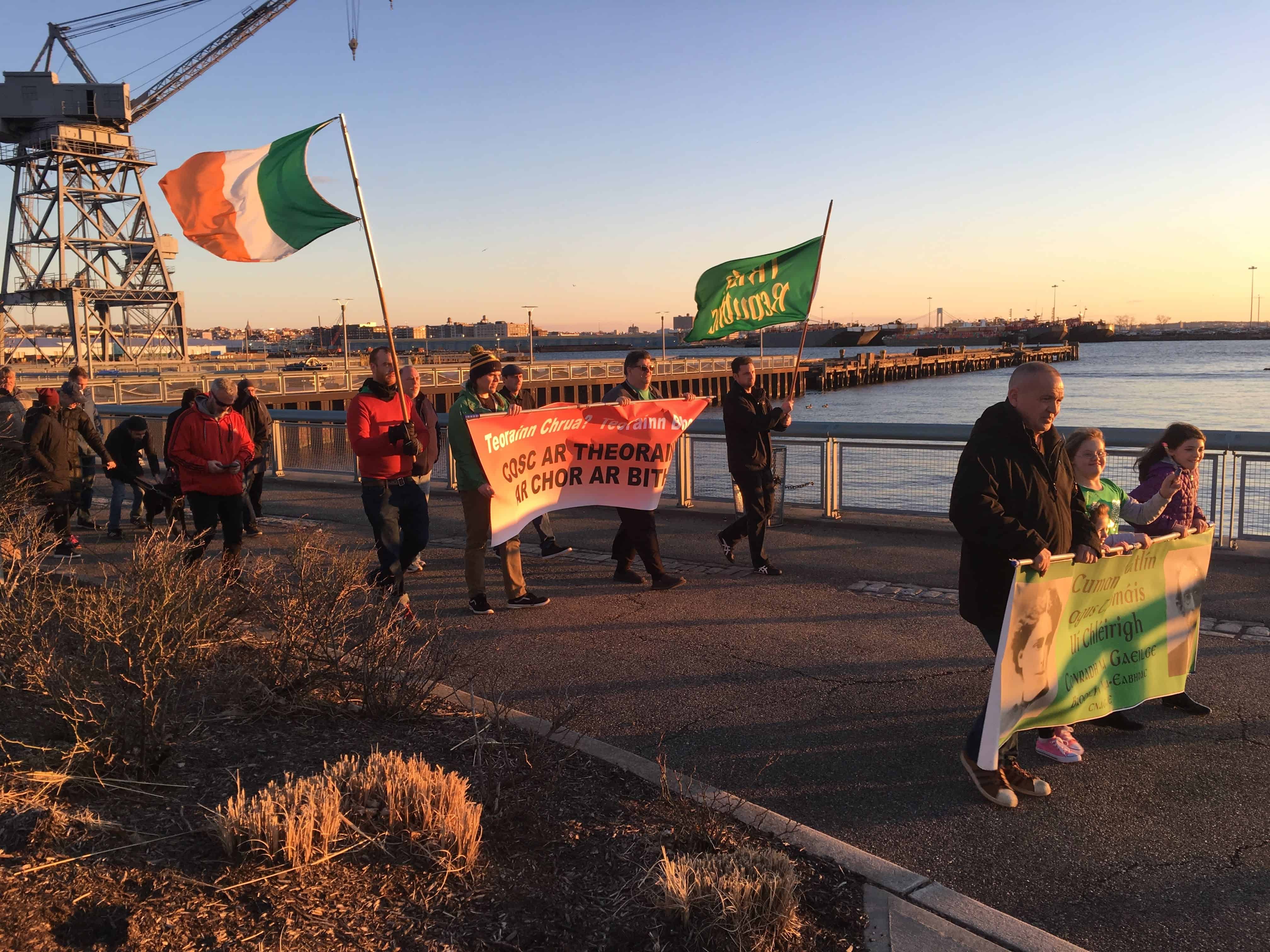On March 17, the Brooklyn branch of the Gaelic League held its annual St. Patrick’s Day parade outside Rocky Sullivan’s, with members making a short loop from the bar on Beard Street to the shoreline at Erie Basin Park with flags and signs in hand. The political concerns of the group, however, extend far beyond Red Hook.
Douglas Hyde, who served as the first President of Ireland from 1938 to 1945, founded the Gaelic League in 1893 to promote the indigenous language of the Irish people. Gaeilge, as it’s known to its speakers, survived centuries of British colonialism and remains the primary daily language for about 75,000 people in mostly rural areas of Ireland.
In 1902, while living abroad, the Irish revolutionary Tom Clarke and his wife Kathleen Clarke followed Hyde’s example and established the Brooklyn Gaelic Society on Red Hook Lane, before returning home to plan the 1916 Easter Uprising against British rule in Ireland. Officially reestablished in 2016, today’s Brooklyn branch of the Gaelic League – called Cumann Cháitlín agus Thomáis Uí Chléirigh (which translates to “The Kathleen and Thomas Clarke Association”) – emerged out of the longstanding Tuesday night Irish language classes at Rocky Sullivan’s.
Its president is Chris Finnegan, and the group has about 30 members. Dáithí Mac Lochlainn, from Queens, currently handles the teaching duties. Four students have won Fulbright Ireland’s Summer Scholarships to study in Ireland. The classes are donation-based.
A Gaelic language, Irish belongs to the Celtic family, alongside Scottish, Breton, and Welsh. “Languages live by being spoken,” Mac Lochlainn said.
Kevin Rawdon comes from Marine Park to participate every week. A guitarist, he became interested in the Irish language due to his interest in Irish music. “I also just wanted a second language in general, and this was the language of my grandparents,” he recalled. “This is the only place that’s really affordable to learn the Irish language.”
John Becker drives down from the Bronx to take part. “It’s very rare in the city that folks are willing to meet on a weekly basis to learn the Irish language, and I think that’s really precious,” he commented.
Mac Lochlainn, however, pointed out that, in recent years, pop-up Gaeltacht events have begun to appear throughout New York (and at Rocky Sullivan’s, too). Gaeltacht is the Irish word for an Irish-speaking region; the pop-ups are social events, often held at bars, where people get together to have friendly conversations entirely in Irish.
Cumann Cháitlín agus Thomáis Uí Chléirigh inaugurated its annual St. Patrick’s Day parade in 2016 as a show of solidarity during political demonstrations in Belfast, where protesters marched in support of a long-promised Irish Language Act, which would give Irish equal status with English in Northern Ireland. The constitution of the Republic of Ireland recognizes Irish as its “national language,” but in the United Kingdom’s Northern Ireland, Irish can’t be used in the courts or legislature, nor does it appear on public signage.
 “It’s a human right,” said Red Hook resident Fachtna Ó hAodha, who grew up speaking Irish in Cork. “If you want to speak your language, you can speak your language.”
“It’s a human right,” said Red Hook resident Fachtna Ó hAodha, who grew up speaking Irish in Cork. “If you want to speak your language, you can speak your language.”
The Brooklyn branch of the Gaelic League continues to support the Irish Language Act, but the theme of 2019’s parade was Brexit. “Hard border? Soft border? No border at all!” was the slogan. A political partition has divided the island of Ireland since 1920, but the UK’s withdrawal from the European Union has renewed Irish nationalists’ hopes for a united, sovereign Ireland.
UK lawmakers recognize the danger of placing border checkpoints and customs inspectors on the currently open border between the Republic of Ireland (which will remain in the EU) and Northern Ireland only two decades after the end of the Troubles, whose violence plagued the border region. A proposed solution known as the “Irish backstop” would keep Northern Ireland in the EU’s customs union and single market and place the border somewhere instead in the North Channel, between Northern Ireland and Great Britain, creating a travel barrier within the UK itself.
Northern Ireland’s Democratic Unionist Party (DUP) – which in 2017 joined with the Conservative Party in the UK’s House of Commons to form Prime Minister Theresa May’s minority government – has rejected the Irish backstop out of fear that it would put Northern Ireland on a path to reunification with its southern neighbor. The right-wing, historically anti-Catholic DUP, which seeks to defend the “Britishness” of Northern Ireland (with its Protestant plurality) against the left-wing nationalist party Sinn Féin, also opposes the Irish Language Act, with one major DUP politician referring to Irish as a “leprechaun language.”
Mac Lochlainn believes that a united Ireland “will happen. I think it’s becoming inevitable.” He looks forward to the day when the Irish language will no longer carry “political baggage.”
Until then, Brooklyn’s Gaelic League members will march each St. Patrick’s Day. Chris Byrne, who performed traditional Irish songs at Rocky Sullivan’s after the parade, likes the simplicity of their event, which he held in contrast to “corporate” parades with product tie-ins. “There’s no schmaltz,” he explained. “It’s a grassroots expression of our Irishness, especially in terms of the Irish language, which is under attack, and we feel like we’re keeping the flag flying for the language.”









